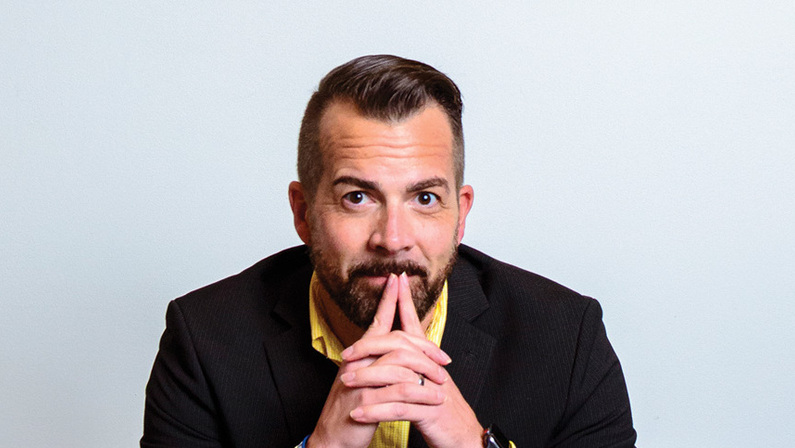Stanford sure is proud of their man Noel Vest. So proud in fact that the University praised the good Doctor in its News, Magazine and Scope. Then again, they’ve got every good reason to be proud. Especially considering his after-prison PhD marks but the beginning of some incredibly fruitful work. We’re kinda proud of Doc Vest too. And we don’t even know the man. Seems super-sized pride is contagious.
That’s the big idea behind Good News Fridays. We want to spread the good news. So each and every week we’ll be recognizing someone (or something) that’s somehow benefitting the addiction recovery community. It could something as simple as a good deed, or something as complex as a new law. It could also be something as inspiring as a life turned right-side up, as well as the super-sized pride that comes about as a result. Anything that truly brightens everybody’s day.
Happy Friday!
That After-Prison PhD
Lovelock Correctional Center. Vest is a guest of the Nevada Department of Corrections. He wasn’t considered a particularly long-term guest. Until, that is, you got wind of the crime and its sentence. See, Vest had walked into a Las Vegas Sears and attempted to open an account in someone else’s name. Hardly the most egregious crime. Unfortunately, Vest already had 15 felonies on his record. That made him a habitual criminal.
He got seven years.
The worst thing was that Vest’s mother had turned him into the authorities. It was probably also the best thing. After all, he’d been in and out of rehabs more times than anyone could remember, let alone count. He had about the same amount of jail stays too. Prison would at least provide Vest with enough time and distance to finally get clean.
Turns out it provided more. One day Vest was watching a television show featuring drug and alcohol counselors. ‘That could be me,’ he thought. So upon release, Vest enrolled in Columbia Basin College, earned an Associates Degree in Chemical Dependency Counseling and — voila! — it was him. Then just like that Vest saw a different light. Counseling wouldn’t be enough.
Vest was at Washington State within the proverbial two shakes. There he topped both a Bachelors and a Masters of Science with a PhD in Experimental Psychology. Not bad for an ex-con who barely finished high school. Again though Vest had gotten a taste of higher, brighter, further. And he wanted more.
And more he got. Vest is now a postdoctoral scholar in Stanford Medicine’s prestigious Systems Neuroscience and Pain Lab. Furthermore writes Stanford Medicine’s Tracie White, “his experience as a person in recovery from methamphetamine addiction helps inspire his research into addiction and mental health.”
Mind if we say “Wow!”?
Above & Beyond
Vest is putting that after-prison PhD to good use. Great good use. You might even say he’s wielding his degree as if it were a weapon, striking down obstacles to peoples’ recovery. His two main targets? Dual-Diagnosis Disorders and Application Discrimination. Otherwise known as co-existing addiction issues and the Criminal Record check box on employment/admissions/rental applications. Vest is intimately familiar with both. He’s also seriously determined to treat and eradicate accordingly.
Indeed. Vest told White “he became aware of the link between mental illness and substance abuse during prison AA meetings. He also learned how common the dual-diagnosis is, and recognized how his own moderate depression had contributed to his years of addiction.”
That’s largely why Vest “focussed his doctoral research on the intersection of mental health and substance use disorder.” And why he’s continuing along similar lines at Stanford.
Vest said his higher education pursuits would have been much more difficult had his college application inquired about his criminal record. In fact, they may not even have been possible.
“Reentering society after prison is already hard enough,” he told Stanford News’ Alex Kekauoha. “And placing restrictions on employment, housing and education only serves to dehumanize this already highly stigmatized group.”
Vest finds it especially disheartening considering “we know that nothing is more effective at reducing recidivism than obtaining a college degree.”
That’s why Vest helped draft the 2018 Fair Chance in Higher Education Act. The bill prohibits Washington State colleges and universities from asking applicants about their criminal records before offering them admission. Now that Vest is at Stanford, he’s helping to introduce a Ban the Box Bill for California colleges and universities too.
Healing Properties Applauds
Healing Properties applauds Dr. Vest, for his after-prison PhD, as well as his Stanford Medicine research and advocacy. We also applaud his efforts to Ban the Box. We can only hope and pray that more states recognize the efficacy of fair chances — for everyone’s sake.
We’re also incredibly encouraged by Dr. Vest’s recent examining of long-term recovery rates for people diagnosed with both mental illness and addiction. We too are well aware of the necessity of assessing and addressing both sides of every dual-diagnosis. And we’re also well aware of the benefits to be found through Alcoholics Anonymous. Consequently we were not surprised to see that combining inpatient psychiatric treatment with AA would prove to be a double plus. We were however surprised to see numbers reach 90% and indicate such long-term efficacy. In fact, we were deliriously surprised. You’re right, good Doctor. “This is huge.” [emphasis added] From any given perspective — public health or otherwise.
(Photo by Toni Bird Stanford Magazine with Great Gratitude)
